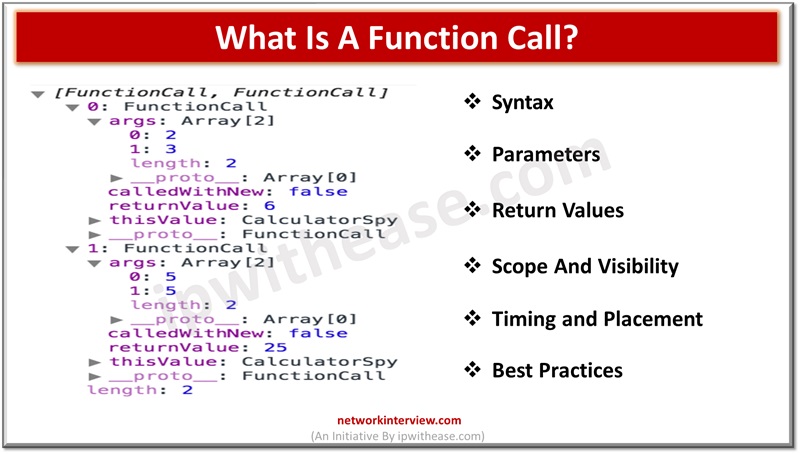
What Is A Function Call? Enhancing Your Code With Effective Use of Function Calls
In software development, functions are the backbone of clean, reusable, and maintainable code. But to truly excel in programming, one must understand how to write functions and how to effectively wield the power of function calls. Let us unravel the enigma of function calling or function call use, exploring how it can transform your code from mundane to magnificent.
The Essence Of Functions In Programming
Before delving into function calls, let’s revisit the basics. A function is a discrete chunk of code designed to perform a specific task. By neatly packaging this functionality into a standalone entity, functions promote code reuse, improve readability, and simplify debugging.
Imagine a chef in a kitchen, and each dish on their menu may require slicing an onion. Rather than learning the technique each time, the chef simply executes the “slice onion” function. It’s a testament to efficiency and consistency mirrored in program functions.
What Is A Function Call?
A function call is the bridge between a function’s potential and its execution. Calling a function is akin to dialing a number on your phone; you’re requesting a connection to whom or what you wish to communicate. In coding terms, it is the moment you engage a function to run and complete its task within the script.
However, a function call isn’t just about getting the job done; it’s about doing so effectively. Understanding when and how to make these calls is paramount in engineering outstanding software.
Syntax: The Gateway To Calling Functions
Every programming language has its unique syntax for calling functions, but it commonly involves specifying the function name followed by parentheses. Within these parentheses, you can pass information to the function, known as arguments, allowing you to customize the function’s behavior.
Parameters: Fine-Tuning Your Function Calls
Parameters are the blueprints for crafting your inputs. When you write function, you define parameters, these are named entities representing the data type your function expects. When function calling, you provide arguments that fill those parameters with actual values. Think of it as ordering a pizza; you decide the toppings (arguments) based on the menu’s options (parameters).
Return Values: Extracting Worth From Function Calls
A function’s return value is the outcome of its operations, handed back to the place of call. Not all functions need to return a value, but for those that do, the return statement delivers the product of a function to the rest of your code.
Using our cooking analogy, returning a value is like serving the prepared dish; it’s the tangible result of your efforts.
Timing and Placement: The Strategy Of Function Calls
As crucial as knowing how to call functions is knowing when and where to call them. Position calls strategically within your code flow to ensure optimal performance and clarity. Factor in dependencies, possible side effects, and the logical sequence of tasks.
Much like a well-timed joke can enhance a speech, well-timed function calls can significantly uplift your code.
Scope And Visibility: Knowing The Boundaries
Be aware of the scope and the context within which values and expressions are visible or referenced. Understand global and local scopes to determine where your functions can or should be called.
In simple terms, you wouldn’t want to call someone else’s phone accidentally, and similarly, avoid calling functions where they shouldn’t operate or cannot access needed information.
Best Practices: The Art Of Masterful Function Calls
Mastering function calls is crucial. Here are some best practices:
- Keep it DRY: Do not Repeat Yourself is a principle encouraging the reduction of code duplication, which functions and their calls are perfect for.
- Modularity: Design your functions into self-contained modules for easier testing, debugging, and maintenance.
- Descriptive Names: Choose clear and descriptive names for functions and parameters to enhance code readability.
- Limit Arguments: A “crowd” of arguments can make function calls cumbersome and confusing; strive for a minimalistic approach.
- Error Handling: Anticipate what could happen when calling a function and prepare responses or fallbacks to handle exceptions gracefully.
Conclusion
Function calls are not merely a technicality; they are an opportunity. With every call, you are weaving a thread in the tapestry of your software. Picking the right thread at the right time determines the strength and beauty of the final weave. Armed with a strategic and knowledgeable approach to function calls, you can elevate your coding practice to the zenith of efficacy and elegance.
Craft each function call with the precision of an artisan, and watch as your code becomes a robust and cohesive construct, ready to withstand the rigors of performance and scale. Remember, the might of your applications lies not just in the functions you define but profoundly in when and how you call them into action.
Continue Reading:
Agile vs Lean: Software Development Methodologies
Low-Code Platform: The New Way to Build Software Applications



